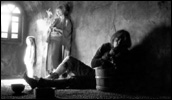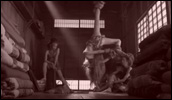Imprint
- Year
- 2006
- Original title
- Imprint
- Alternative title
- Masters of Horror: Imprint
- Director
- Cast
- Running time
- 63 minutes
- Published
- 15 September 2006



by Nicholas Rucka
When I first saw Audition in the US theaters I witnessed first-hand the shock and awe of well-made relentless horror. Not only did it have one of the largest walk-outs that I've ever seen, it was only after the house lights went up that I saw the aftermath of the hell that Takashi Miike and Ryu Murakami had caused: panic strewn trash, spilled drinks, vomit, and the thousand yard stares of stunned audience members.
But that's one of the reasons why we go to horror films in the first place, right? To be shocked, chilled, thrilled, and a little sickened? Perhaps it's true, as someone once said, if you're never sick then how do you know if you are alive? Audition, for sure, is unusually effective at getting under our skins because, like Ryo Ishibashi's Shigeru being punished in such an unexpected and incongruously vicious way as a result of his trusting Eihi Shiina's Asami, the audience is also dragged under because of our trust in Miike's storytelling - that he won't go there; that it won't be that bleak.
To be sure, we are affected because we are empathetic to these people and what we are led to believe is a blossoming love affair; when the darkness comes it is unexpected and, well, undeserved. The horror becomes personal, irrational, and somehow deliberately evil in its clinical pacing. Eyes, needles, piano wire, and feet... the threat of emasculation before a pathetic death is evidence of a deeper twisted psychosis - a misanthropy that Shigeru, or the audience, could have no way of knowing existed within the 'angelic' Asami; that she is no longer human, that 'no one is home'. There is something about the irrational nature of this story that echoes old Japanese folklore as found, for example, in Akinari Ueda's stories, where the misfortune of being in the wrong place at the wrong time served as an allegory for the fragility of life and the seeming arbitrariness of our own (potential) demise.
When Mick Garris (Stephen King's preferred director of choice for his screen adaptations and writer of such films as *Batteries Not Included and The Fly II) announced his new anthology horror series Masters of Horror, it was greeted simultaneously with excitement and dread by horror fans around the world. While ostensibly a vanity project for US pay-cable channel Showtime, the roots of Masters of Horror are found in an informal bi-monthly dinner of veteran horror directors who longed to work together. Simply, the Masters of Horror would join the directors under this umbrella moniker and let them direct unrelated mini-horror films that would be broadcast once a week over a broadcast season. (In a sense, this could be thought of as a semi-return to the heyday of horror anthology TV minus the host intros.)
Critically, choosing the title Masters of Horror is of debatable wisdom considering the fact that it places the minimum status of excellence - not to mention a potentially prohibitive level of audience expectation - on the producers, filmmakers, and Showtime. But no matter, the selection of directors (the 'Masters') seemed to be good. They included genre staples: John Carpenter, Dario Argento, and Don Coscarelli, to name a few; and the unexpected: Joe Dante, Lucky McKee, and Takashi Miike.
Wait, Takashi Miike? The horror crowd erupted. The Japanese bad boy of Ichi the Killer and Audition fame would be let loose on a horror segment designed for horror fans, it was almost too much. When it was later reported that Miike's production, Imprint, would not be broadcast (purportedly because of its unrelenting content), word spread that Imprint delivered the goods. The fan community couldn't be happier.
Imprint's story is simple: Time unknown - but it could be Meiji-era Japan as viewed through an Edogawa Rampo lens - and Christopher (Billy Drago) has come by boat to a desolate circle of hellish wasteland filled with cripples, thieves, and whores to save his love, Komomo (Michie Ito), a prostitute with striking red hair. Only thing, she's committed suicide - or so Youki Kudoh's nameless, scar-faced prostitute tells him. In a fit of denial and shockingly bad acting, Christopher demands to know the true story of what happened to his beloved Komomo. What he - and the audience - are regaled about is a twisted story of whorehouse infighting, jealousy, extreme sadism, and, somehow, back-alley abortions; all of which is portrayed in unflinching detail by Takashi Miike.
Too strong for cable TV! The sales angle is brilliant! Fans of Miike and his extreme side will rejoice; Imprint IS twisted. But it doesn't work.
The most obvious critique I've heard about it is that Billy Drago's performance is dreadful and this somehow compromises the production- and to be sure, his performance is remarkably bad at points - but I didn't mind all of his choices and the performances of several other actresses in the production aren't anything to celebrate either. Is this a question of Takashi Miike directing in a language that he doesn't speak? While undoubtedly a factor, I think story weaknesses coupled with a half-baked narrative and misguided (character) emotional motivation, are the main culprit.
Here's the thing, stories that depend on the successful recounting of personal information as flashback are always tricky to pull off. This is something that is easier to do in writing than in visual storytelling and has been successfully executed many times in horror and fantastic literature. (Some examples of authors who have employed this storytelling are H.P. Lovecraft, Edgar Allan Poe, and Edogawa Rampo.) What I'm addressing specifically here is the key piece of information that the narrator of the story is mad, but as an audience we are unaware of this until it is revealed at the end of the story. The twist, of course, is that once we learn that the narrator is crazy, we are forced to reconsider everything that we've been told up until this point. Our point of view and information has been compromised. As a storytelling trick it is quite powerful because when employed well, it forces a deeper analysis from the audience about the content of the piece and the audience's ingestion of information as fact. (A skeptical audience is a better informed one, as the thinking goes.) In a sense, this type of storytelling could be considered a thematic focusing device for the author and one that forces the audience to more carefully consider the issues that are being addressed.
One of the risks inherent to this type of storytelling is the risk of alienating your audience. The audience might very well feel gypped unless the storytelling is so tight that there is no room for doubt. An example where this works is in Takashi Shimizu's Marebito (a.k.a. The Stranger from Afar). But it doesn't work for me in Imprint and here's why: the perspective shifts from Christopher's to the Woman's (Youki Kudoh's) are not so much experientially based as it is based on our character's (Christopher's) interpretation. The idea is that we're just as in the dark about what happened to Komomo as Christopher is and so we want to know what happened as much as he does - an acceptable premise for the audience's ride in this story. As the scar-faced woman begins to switch her tale of what happened to Komomo, we're ostensibly still with Christopher and his search for the truth. But when we find out that Christopher might not be the most reliable main character to be riding with it somehow feels as a dishonest storytelling trick that is designed to shock the audience, but there is no way to know that it is coming. Imprint just doesn't lay the clues down in the right order to deliver an ending like this where the audience can't help but feel that there was no way of knowing it was coming. When the inevitable switcheroo comes in Imprint, but it is not revelatory, it becomes an A-HA! plot twist without any narrative basis and reeks of deus ex machina. Basically it becomes a shaggy-dog story (with some sort of different ending tacked onto it).
Technically, Imprint is very accomplished. Toyomichi Kurita's cinematography is top-shelf, belying his history in both the US and Japanese film worlds. Filled with good lighting, camera and framing choices it makes for a strongly atmospheric piece. This carries over to the art direction, production, and costume designs, too, all of which are of first-rate craftsmanship. And that is what makes Takashi Miike's Imprint all the more disappointing due to weak scripting, bad performances, and a deflation that comes from it ultimately being a shaggy-dog story. I did wonder while watching this whether just keeping the story in Japanese with Japanese actors would have helped. My suspicion is that it would have helped the performances, but the narrative problems were there from the beginning and ultimately compromise it.
There is one thing to keep in mind about Imprint and your taste in horror. Since so much of horror fandom does arise out of the splatter and gore thrills, Imprint most likely will work for you. The torture is twisted and while I have some issues with it being too lovingly photographed (almost like Nobuyoshi Araki photographs), it will make you wince. The shots of countless bloody fetuses will also deliver the gore-goods for many fans. In the end, this thrill and chill is what many people want from their horror, story be damned. If that sounds about right for you, then Imprint will deliver. I'll take better storytelling.